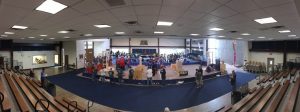The sun beams onto the turf as whispers of excitement border the sidelines. These muffled sounds wrestle with the upbeat tunes pouring out of the loudspeakers onto the field. Aromas of pizza and popcorn waft into the playing area, intermingled with the faint odor of stress and perspiration from the coaches hovering over their players. Two teams line up facing each other, each player nose to nose, processing all of the plans they have been practicing up to this point. Each of the six players proudly wearing their colors and numbers take their positions, each warming up for the game. Trainers stand idle with the tools of their trade, ready to patch up injured players. At the sound of the referee, the teams spring into action, vying for a chance to prove themselves in preparation for the regular season of league play in 2016.
This scene has played out in Spring football scrimmages for decades across Texas and over the United States, however, there is another type of scrimmage that occurred on Saturday, February 20th in our own backyard, the Terry Center at Jesuit. In this type of scrimmage, the players are not humans, but machines. These machine players, robots built by high school students all over the world, are competitors in a league resembling one that plays on a gridiron, or hardwood or other field. Just as it is important in a complex game like football to practice frequently, the competitive game in FIRST Robotics is also a very intricate and challenging game requiring driving practice and design iterations. Out of more than 3000 FIRST Robotics Challenge teams registered this year, Jesuit hosted 15 teams, several of them rookies, from the DFW area to offer a full practice field and access to a state-of-the-art lab.
As important as this annual event is for the Jesuit robotics program, the event, more importantly, gives Jesuit another great opportunity for service to our sister schools in the surrounding community. Because many teams lack the resources and sponsors of Jesuit robotics, the scrimmage was a way to give other advice and help teams make modifications to their robots using the tools and supplies in the shop in addition to practicing and learning together. While some Jesuit students and mentors modified and drove the practice robot upstairs, some built, modified, and repaired teams’ parts beneath the field. Reflecting on the significance of the scrimmage as an embodiment of Jesuit ideals, Spencer Gautreaux ’17, a design lead of the Jesuit All Sparks team commented that “scrimmage day provides the team with the opportunity to grow beyond competition and into active participation in the local FIRST Robotics community.”
Even though the teams attending sacrificed time on Saturday that they could have used to work on their individual robots, they gained valuable time working with other teams, getting tips and building relationships that will likely come in handy during live matches in a few weeks. The scrimmage also revealed several design flaws in each robot with enough lead time to allow teams to make the needed changes before upcoming tournaments. Providing the opportunity to break and fix robots in one fun-packed day, the scrimmage was a mutual gain for Jesuit team, 2848, and the surrounding area of FIRST Robotics. Scrimmages are a way of life for players in Texas spring competitions, whether of man or machine.

